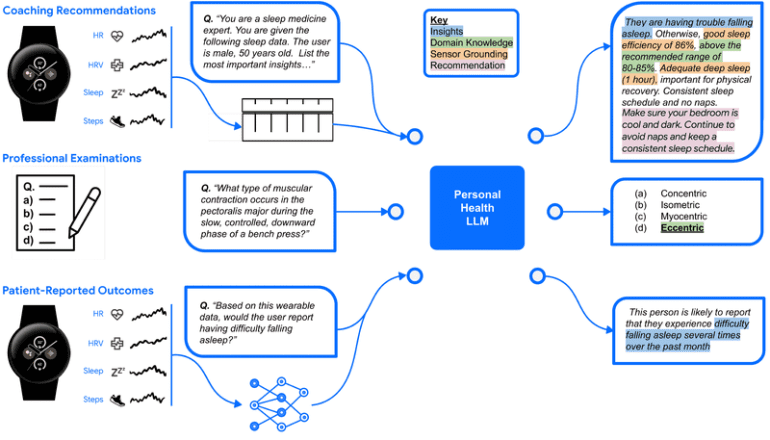- Google pioneers AI-driven approach to personalize health insights using data from mobile and wearable devices.
- Introduction of Personal Health Large Language Model (PH-LLM) and insights agent powered by Gemini Ultra 1.0.
- PH-LLM contextualizes physiological data for personalized recommendations, while insights agent offers iterative analysis of wearable data.
- Research demonstrates PH-LLM’s proficiency in generating insights comparable to expert performance and exceeding human expert scores in sleep medicine and fitness certifications.
- Insights agent showcases superior numerical accuracy and reasoning quality compared to non-agent baselines.
- Google’s vision extends beyond sleep and fitness data, promising deeper insights into broader health information like medical records and nutrition data.
Main AI News:
In a world where personal health and wellness are increasingly prioritized, Google emerges as a trailblazer, harnessing the power of advanced artificial intelligence (AI) to revolutionize how individuals monitor and improve their well-being. The company’s recent press release unveils a groundbreaking initiative aimed at leveraging the wealth of data collected by mobile and wearable devices to provide unparalleled insights and recommendations tailored to each individual’s unique health journey.
At the heart of Google’s endeavor lies the recognition of the transformative potential of continuous, granular, and longitudinal data sourced from these devices. From step counts to heart rate variability, sleep duration, and beyond, the data collected offers a comprehensive snapshot of an individual’s physiological state and behavioral patterns. Armed with this wealth of information, individuals can not only monitor their health but also find motivation to adopt and maintain healthy behaviors.
Google’s approach hinges on the integration of generative AI models, which possess the capability to analyze complex time-series data and contextualize it with relevant personal health domain knowledge. This fusion enables the models to provide personalized interpretations and recommendations, grounded in the individual’s unique health context. What emerges is a powerful tool that empowers individuals to make informed decisions about their health and well-being.
The company’s research introduces two pioneering approaches aimed at advancing personal health and wellness insights using Large Language Models (LLMs). The first approach, detailed in the paper “Towards a Personal Health Large Language Model,” introduces the Personal Health Large Language Model (PH-LLM). This finely-tuned iteration of Gemini specializes in generating insights and recommendations tailored to sleep and fitness patterns. Leveraging a multimodal encoder, PH-LLM exhibits a remarkable capacity to understand textual input and interpret raw sensor data with precision.
To evaluate PH-LLM’s efficacy, Google curated benchmark datasets spanning a spectrum of personal health tasks. These datasets serve as litmus tests for the model’s ability to produce detailed insights and recommendations, leverage expert-level domain knowledge, and predict self-reported assessments of sleep quality. The results are nothing short of remarkable, with PH-LLM demonstrating a capacity to rival expert performance in fitness-related tasks and surpass average human expert scores in sleep medicine and fitness certifications.
The second approach, outlined in the paper “Transforming Wearable Data into Personal Health Insights,” introduces a framework for a personal health insights agent powered by Gemini Ultra 1.0. This agent represents a convergence of LLMs, code generation, and information retrieval tools, enabling it to analyze raw wearable data and provide personalized interpretations and recommendations for health queries. Through iterative reasoning and interaction with tools, the agent demonstrates a superior ability to deliver numerical accuracy and reasoning quality compared to non-agent baselines.
But Google’s vision extends beyond sleep and fitness data; it encompasses a broader range of health information, from medical records to nutrition data. The potential for LLM-based agents to offer increasingly sophisticated insights and guidance for personal health management is vast and promising. As these models continue to evolve, individuals can look forward to a future where AI serves not only as a tool for monitoring health but also as a trusted companion in their journey towards holistic well-being.
Conclusion:
Google’s groundbreaking research signifies a monumental shift in the personal health market. By harnessing the power of AI to provide personalized health insights, Google sets a new standard for health monitoring and management. This innovation not only empowers individuals to make informed decisions about their well-being but also presents lucrative opportunities for businesses to capitalize on the growing demand for AI-driven health solutions. As consumers seek more personalized and data-driven approaches to health, companies that can adapt and integrate AI technologies into their offerings stand to gain a competitive edge in this evolving market landscape.

